- Home
- Tom Stoppard
Every Good Boy Deserves Favor & Professional Foul Page 4
Every Good Boy Deserves Favor & Professional Foul Read online
Page 4
COLONEL: Quite right!
(The COLONEL turns to ALEXANDER.)
Alexander Ivanov?
ALEXANDER: Yes.
COLONEL: Do you have an orchestra?
(IVANOV opens his mouth to speak.)
(To IVANOV.) Shut up!
(To ALEXANDER.) Well?
ALEXANDER: No.
COLONEL: Do you hear any music of any kind?
ALEXANDER: No.
COLONEL: How do you feel?
ALEXANDER: All right.
COLONEL: Manners!
ALEXANDER: Thank you.
COLONEL: (To DOCTOR) There’s absolutely nothing wrong with these men. Get them out of here.
DOCTOR: Yes, Colonel—Doctor.
(The COLONEL’s exit is almost as impressive as his entrance, also with organ music. But this time the organ music blends into orchestral music—the finale.)
The TEACHER moves into the orchestra. The DOCTOR moves to the violins taking his instrument and joining in. IVANOV takes his triangle and joins the percussionists and beats the triangle.
SACHA comes across to the middle of the platform at the bottom. These directions assume a centre aisle going up the middle of the orchestra towards the organ. ALEXANDER and SACHA move up this aisle, SACHA running ahead. At the top he turns and sings to the same tune as before:
SACHA: (Sings) Papa, don’t be crazy!
Everything can be all right!
ALEXANDER: Sacha—
SACHA: (Sings) Everything can be all right!
(Music. Music ends.)
PROFESSIONAL FOUL
A Play for Television
To Vaclav Havel
Characters
ANDERSON
MCKENDRICK
CHETWYN
HOLLAR
BROADBENT
CRISP
STONE
CAPTAIN (MAN 6)
POLICEMAN (MAN 1)
POLICEMAN (MAN 2)
POLICEMAN (MAN 3)
POLICEMAN (MAN 4)
POLICEMAN (MAN 5)
MRS HOLLAR
SACHA (ten years old)
GRAYSON
CHAMBERLAIN
FRENCHMAN
CHAIRMAN
CLERK, LIFT OPERATORS, CONCIERGES, INTERPRETERS, CUSTOMS, POLICE, etc.
Professional Foul was first shown on BBC TV in September 1977. The cast was as follows:
ANDERSON
Peter Barkworth
MCKENDRICK
John Shrapnel
CHETWYN
Richard O’Callaghan
HOLLAR
Stephen Rea
BROADBENT
Bernard Hill
CRISP
Billy Hamon
STONE
Shane Rimmer
CAPTAIN
David de Keyser
MAN 1
Ludwig Lang
MAN 2
Milos Kirek
MAN 3
Arnoft Kopecky
MAN 4
Paul Moritz
MRS HOLLAR
Susan Strawson
SACHA
Stefan Ceba
GRAYSON
Sam Kelly
CHAMBERLAIN
Victor Longley
FRENCHMAN
Graeme Eton
CHAIRMAN
Ivan Jelinek
CLERK
Patrick Monckton
INTERPRETER
Sandra Frieze
Script Editor
Richard Broke
Designer
Don Taylor
Producer
Mark Shivas
Director
Michael Lindsay-Hogg
1. INT. AEROPLANE. IN FLIGHT
The tourist class cabin of a passenger jet.
We are mainly concerned with two passengers. ANDERSON is an Oxbridge don, a professor. He is middle-aged, or more. He is sitting in an aisle seat, on the left as we look down the gangway towards the tail.
MCKENDRICK is also in an aisle seat, but across the gangway and one row nearer the tail. MCKENDRICK is about forty. He is also a don, but where ANDERSON gives a somewhat fastidious impression, MCKENDRICK is a rougher sort of diamond.
MCKENDRICK is sitting in the first row of smokers’ seats, and ANDERSON in the last row of the non-smokers’ seats looking aft.
The plane is by no means full. The three seats across the aisle from ANDERSON are vacant. The seat next to ANDERSON on his right is also vacant but the seat beyond that, by the window, accommodates a SLEEPING MAN.
On the vacant seat between ANDERSON and the SLEEPING MAN is lying a sex magazine of the Penthouse type. The magazine, however, is as yet face down.
The passengers are coming to the end of a meal. They have trays of aeroplane food in front of them.
MCKENDRICK puts down his fork and lights a cigarette.
ANDERSON dabs at his mouth with his napkin and puts it down. He glances around casually and notes the magazine next to him. He notes the SLEEPING MAN.
MCKENDRICK has a briefcase on the seat next to him, and from this he takes a glossy brochure. In fact, this is quite an elaborate publication associated with a philosophical congress. The cover of this programme is seen to read: ‘Colloquium Philosophicum Prague 77’.
ANDERSON slides out from under his lunch tray a brochure identical to MCKENDRICK’s. He glances at it for a mere moment and loses interest. He turns his attention back to the magazine on the seat. He turns the magazine over and notes the naked woman on its cover. He picks the magazine up, with a further glance at the SLEEPING MAN, and opens it to a spread of colour photographs. Consciously or unconsciously he is holding the brochure in such a way as to provide a shield for the magazine.
MCKENDRICK casually glancing round, sees the twin to his own brochure.
MCKENDRICK: Snap.
(ANDERSON looks up guiltily.)
ANDERSON: Ah …
(ANDERSON closes the magazine and slides it face-up under his lunch tray.
MCKENDRICK’s manner is extrovert. Almost breezy.
ANDERSON’s manner is a little vague.)
MCKENDRICK: I wasn’t sure it was you. Not a very good likeness.
ANDERSON: I assure you this is how I look.
MCKENDRICK: I mean your photograph. (He flips his brochure open. It contains small photographs and pen portraits of various men and women who are in fact to be speakers at the colloquium.) The photograph is younger.
ANDERSON: It must be an old photograph.
(MCKENDRICK gets up and comes to sit in the empty seat across the aisle from ANDERSON.)
MCKENDRICK: (Changing seats) Bill McKendrick.
ANDERSON: How odd.
MCKENDRICK: Is it?
ANDERSON: Young therefore old. Old therefore young. Only odd at first glance.
MCKENDRICK: Oh yes.
(ANDERSON takes a notebook, with pencil attached, from his pocket and writes in it as he speaks.)
ANDERSON: The second glance is known as linguistic analysis. A lot of chaps pointing out that we don’t always mean what we say, even when we manage to say what we mean. Personally I’m quite prepared to believe it. (He finishes writing and closes the notebook. He glances uneasily out of the window.) Have you noticed the way the wings keep wagging? I try to look away and think of something else but I am drawn back irresistibly … I wouldn’t be nervous about flying if the wings didn’t wag. Solid steel. Thick as a bank safe. Flexing like tree branches. It’s not natural. There is a coldness around my heart as though I’d seen your cigarette smoke knock against the ceiling and break in two like a bread stick. By the way, that is a non-smoking seat.
MCKENDRICK: Sorry
(MCKENDRICK stubs out his cigarette. ANDERSON puts his notebook back into his pocket.)
ANDERSON: Yes, I like to collect little curiosities for the language chaps. It’s like handing round a bag of liquorice allsorts. They’re terribly grateful. (A thought strikes him.) Oh, you’re not a language chap yourself?
(The question seem
s to surprise MCKENDRICK, and amuse him.)
MCKENDRICK: No. I’m McKendrick.
ANDERSON: You’ll be giving a paper?
MCKENDRICK: Yes. Nothing new, actually. More of a summing-up of my corner. My usual thing, you know …?
(MCKENDRICK is fishing but ANDERSON doesn’t seem to notice.)
ANDERSON: Jolly good.
MCKENDRICK: Perhaps you’ve come across some of my stuff…?
(ANDERSON now wakes up to the situation and is contrite.)
ANDERSON: Clearly that is a reasonable expectation. I am sorry. I’m sure I know your name. I don’t read the philosophical journals as much as I should, and hardly ever go to these international bunfights. No time nowadays. They shouldn’t call us professors. It’s more like being the faculty almoner.
MCKENDRICK: At least my paper will be new to you. We are the only English, actually singing for our supper, I mean. I expect there’ll be a few others going for the free trip and the social life. In fact, I see we’ve got one on board. At the back.
(MCKENDRICK jerks his head towards the back of the plane.
ANDERSON turns round to look. The object of attention is
CHETWYN, asleep in the back row, on the aisle. CHETWYN is younger than
MCKENDRICK and altogether frailer and neater.
ANDERSON squints down the plane at CHETWYN.)
Do you know Prague?
ANDERSON: (Warily) Not personally. I know the name. (Then he wakes up to that.) Oh, Prague. Sorry. No, I’ve never been there. (Small pause.) Or have I? I got an honorary degree at Bratislava once. We changed planes in Prague. (Pause.) It might have been Vienna actually. (Pause. He looks at the window.) Wag, wag.
MCKENDRICK: It’s Andrew Chetwyn. Do you know him?
ANDERSON: (Warily) Not personally.
MCKENDRICK: I don’t know him personally. Do you know his line at all?
ANDERSON: Not as such.
MCKENDRICK: (Suspiciously) Have you heard of him?
ANDERSON: No. In a word.
MCKENDRICK: Oh. He’s been quite public recently.
ANDERSON: He’s an ethics chap is he?
MCKENDRICK: His line is that Aristotle got it more or less right, and St Augustine brought it up to date.
ANDERSON: I can see that that might make him conspicuous.
MCKENDRICK: Oh, it’s not that. I mean politics. Letters to The Times about persecuted professors with unpronounceable names. I’m surprised the Czechs gave him a visa.
ANDERSON: There are some rather dubious things happening in Czechoslovakia. Ethically.
MCKENDRICK: Oh yes. No doubt.
ANDERSON: We must not try to pretend otherwise.
MCKENDRICK: Oh quite. I mean I don’t. My work is pretty political. I mean by implication, of course. As yours is. I’m looking forward to hearing you.
ANDERSON: Thank you. I’m sure your paper will be very interesting too.
MCKENDRICK: As a matter of fact I think there’s a lot of juice left in the fictions problem.
ANDERSON: Is that what you’re speaking on?
MCKENDRICK: No—you are.
ANDERSON: Oh, am I? (He looks in his brochure briefly.) So I am.
MCKENDRICK: ‘Ethical Fictions as Ethical Foundations.’
ANDERSON: Yes. To tell you the truth I have an ulterior motive for coming to Czechoslovakia at this time. I’m being a tiny bit naughty.
MCKENDRICK: Naughty?
ANDERSON: Unethical. Well, I am being paid for by the Czech government, after all.
MCKENDRICK: And what…?
ANDERSON: I don’t think I’m going to tell you. You see, if I tell you I make you a co-conspirator whether or not you would have wished to be one. Ethically I should give you the opportunity of choosing to be one or not.
MCKENDRICK: Then why don’t you give me the opportunity?
ANDERSON: I can’t without telling you. An impasse.
(MCKENDRICK is already putting two and two together and cannot hide his curiosity.)
MCKENDRICK: Look … Professor Anderson … if it’s political in any way I’d really be very interested.
ANDERSON: Why, are you a politics chap?
MCKENDRICK: One is naturally interested in what is happening in these places. And I have an academic interest—my field is the philosophical assumptions of social science.
ANDERSON: How fascinating. What is that exactly?
MCKENDRICK: (Slightly hurt) Perhaps my paper tomorrow afternoon will give you a fair idea.
ANDERSON: (Mortified) Tomorrow afternoon? I say, what rotten luck. That’s exactly when I have to play truant. I am sorry.
MCKENDRICK: (Coldly) That’s all right.
ANDERSON: I expect they’ll have copies.
MCKENDRICK: I expect so.
ANDERSON: The science of social philosophy, eh?
MCKENDRICK: (Brusquely) More or less.
ANDERSON: (With polite interest) McCarthy.
MCKENDRICK: McKendrick.
ANDERSON: And how are things at… er …
MCKENDRICK: Stoke.
ANDERSON: (Enthusiastically) Stoke! An excellent university, I believe.
MCKENDRICK: You know perfectly well you wouldn’t be seen dead in it.
(ANDERSON considers this.)
ANDERSON: Even if that were true, my being seen dead in a place has never so far as I know been thought a condition of its excellence.
(MCKENDRICK despite himself laughs, though somewhat bitterly.)
MCKENDRICK: Very good.
(An AIR HOSTESS is walking down the aisle removing people’s lunch trays. She removes ANDERSON’s tray, revealing the cover of the sexy magazine, in the middle of MCKENDRICK’s next speech and passes down the aisle.)
Wit and paradox. Verbal felicity. An occupation for gentlemen. A higher civilization alive and well in the older universities. I see you like tits and bums, by the way.
ANDERSON: (Embarrassed) Ah …
(The turning of tables cheers MCKENDRICK up considerably.)
MCKENDRICK: They won’t let you in with that you know. You’ll have to hide it.
ANDERSON: As a matter of fact it doesn’t belong to me.
MCKENDRICK: Western decadence you see. Marxists are a terrible lot of prudes. I can say that because I’m a bit that way myself.
ANDERSON: You surprise me.
MCKENDRICK: Mind you, when I say I’m a Marxist…
ANDERSON: Oh, I see.
MCKENDRICK:… I don’t mean I’m an apologist for everything done in the name of Marxism.
ANDERSON: No, no quite. There’s nothing anti-socialist about it.
Quite the reverse. The rich have always had it to themselves.
MCKENDRICK: On the contrary. That’s why I’d be really very interested in any extra-curricular activities which might be going. I have an open mind about it.
ANDERSON: (His wires crossed) Oh, yes, indeed, so have I.
MCKENDRICK: I sail pretty close to the wind, Marx-wise.
ANDERSON: Mind you, it’s an odd thing but travel broadens the mind in a way that the proverbialist didn’t quite intend. It’s only at airports and railway stations that one finds in oneself a curiosity about er—er—erotica, um, girly magazines.
(MCKENDRICK realizes that they’ve had their wires crossed.)
MCKENDRICK: Perhaps you’ve come across some of my articles.
ANDERSON: (Amazed and fascinated) You mean you write for—?
(He pulls himself up and together.) Oh—your—er articles—I’m afraid as I explained I’m not very good at keeping up with the philosophical….
(MCKENDRICK has gone back to his former seat to fish about in his briefcase. He emerges with another girly magazine and hands it along the aisle to ANDERSON.)
MCKENDRICK: I’ve got one here. Page sixty-one. The Science Fiction short story. Not a bad life. Science Fiction and sex. And, of course, the philosophical assumptions of social science.
ANDERSON: (Faintly) Thank you very much.
MCKEN
DRICK: Keep it by all means.
(ANDERSON cautiously thumbs through pages of naked women.)
I wonder if there’ll be any decent women?
2. INT. HOTEL LOBBY. PRAGUE
We are near the reception desk. ANDERSON, MCKENDRICK and CHETWYN have just arrived together. Perhaps with other people. Their luggage consists only of small overnight suitcases and briefcases.
MCKENDRICK is at the desk half-way through his negotiations. The lobby ought to be rather large, with lifts, etc. It should be large enough to make inconspicuous a MAN who is carefully watching the three Englishmen. This MAN is aged thirty-five or younger. He is poorly dressed, but not tramp-like. His name is PAVEL HOLLAR. The lobby contains other people and a poorly equipped news-stand.
We catch up with ANDERSON talking to CHETWYN.
ANDERSON: (Enthusiastically) Birmingham! Excellent university.
Some very good people.
(The desk CLERK comes to the counter where MCKENDRICK is first in the queue. The CLERK and other Czech people in this script obviously speak with an accent but there is no attempt here to reproduce it.)
CLERK: Third floor. Dr McKendrick.
MCKENDRICK: Only of philosophy.
CLERK: Your baggage is there?
MCKENDRICK: (Hastily) Oh, I’ll see to that. Can I have the key, please?
CLERK: Third floor. Dr Anderson. Ninth floor. A letter for you. (The CLERK gives ANDERSON a sealed envelope and also a key. ANDERSON seems to have been expecting the letter. He thanks the CLERK and takes it.)
Dr Chetwyn ninth floor.
(The three philosophers walk towards the lifts. PAVEL watches them go. When they reach the lift ANDERSON glances round and sees two men some way off across the lobby, perhaps at the news-stand. These men are called CRISP and BROADBENT. CRISP look very young, he is twenty-two. He wears a very smart, slightly flashy suit and tie. BROADBENT balding but young, in his thirties. He wears flannels and a blazer. CRISP is quite small. BROADBENT is big and heavy. But both look fit.)
ANDERSON: I say, look who’s over there … Broadbent and Crisp.
(The lift now opens before them. ANDERSON goes in showing his key to the middle-aged WOMAN in charge of the lift.

 The Dog It Was That Died and Other Plays
The Dog It Was That Died and Other Plays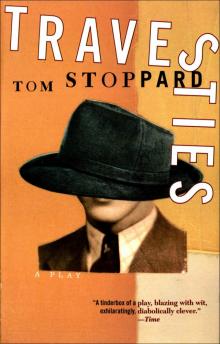 Travesties
Travesties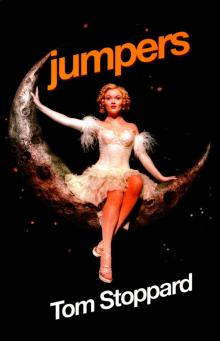 Jumpers
Jumpers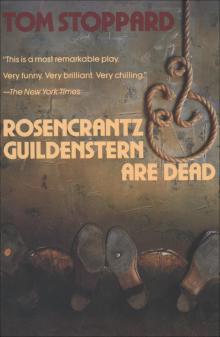 Rosencrantz and Guildenstern Are Dead
Rosencrantz and Guildenstern Are Dead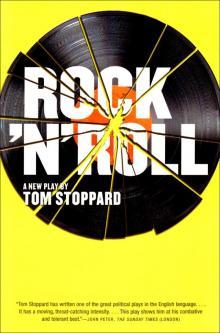 Rock 'N' Roll
Rock 'N' Roll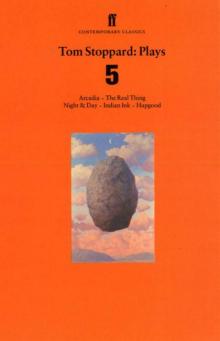 Plays 5
Plays 5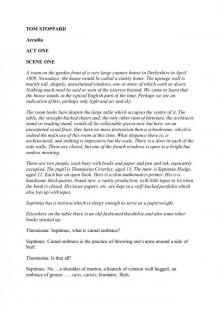 Arcadia
Arcadia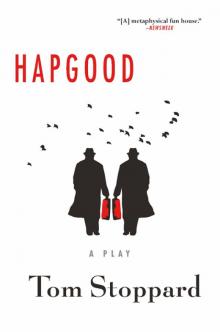 Hapgood
Hapgood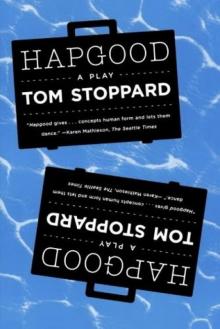 Hapgood: A Play
Hapgood: A Play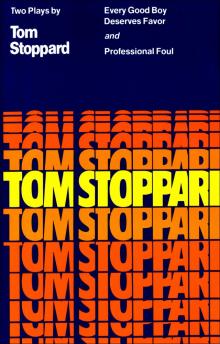 Every Good Boy Deserves Favor & Professional Foul
Every Good Boy Deserves Favor & Professional Foul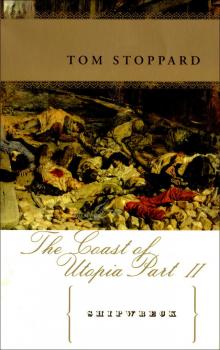 The Coast of Utopia: Voyage, Shipwreck, Salvage
The Coast of Utopia: Voyage, Shipwreck, Salvage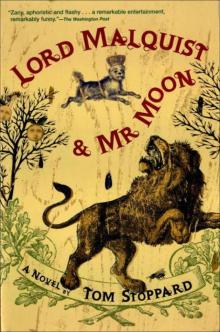 Lord Malquist & Mr. Moon
Lord Malquist & Mr. Moon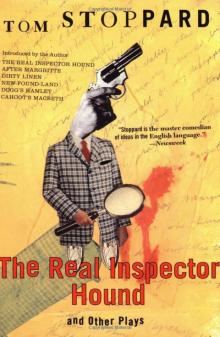 The Real Inspector Hound and Other Plays
The Real Inspector Hound and Other Plays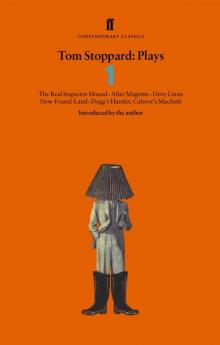 Tom Stoppard Plays 1
Tom Stoppard Plays 1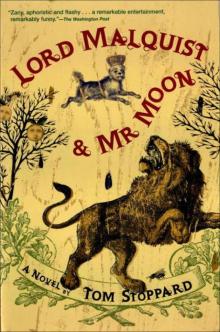 Lord Malquist & Mr. Moon: A Novel
Lord Malquist & Mr. Moon: A Novel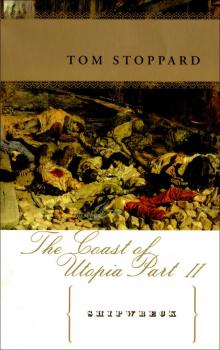 Shipwreck
Shipwreck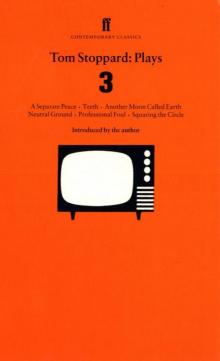 Tom Stoppard Plays 3
Tom Stoppard Plays 3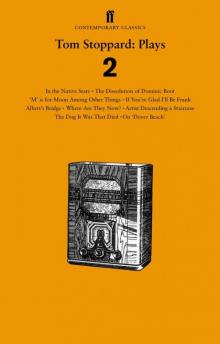 Tom Stoppard Plays 2
Tom Stoppard Plays 2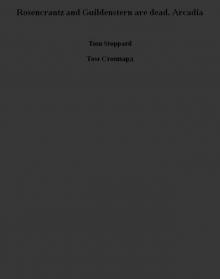 Rosencrantz and Guildenstern are dead. Arcadia
Rosencrantz and Guildenstern are dead. Arcadia